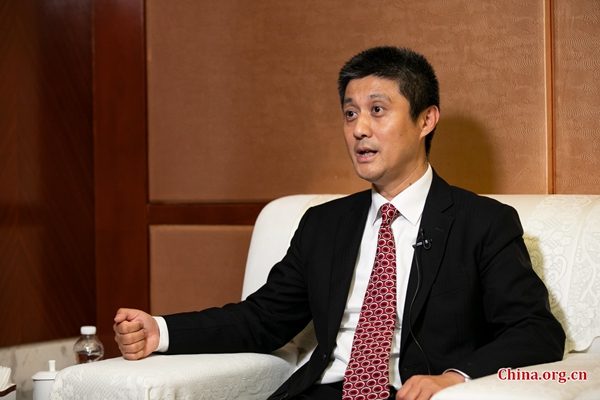
Despite tremendous progress in the past seven decades, a problem-oriented approach should be adopted to promote further development of translation and language services in China, according to Gao Anming, vice president of China International Publishing Group (CIPG).
Speaking in an interview on the sidelines of the Annual Conference of the Translators Association of China 2019 (TAC Conference 2019) in Beijing, Gao said China's development of translation and language services since 1949 has undergone two stages divided by the adoption of the reform and opening-up policy in 1978.
During the first stage from 1949 to that date, a large number of fine literature works were translated from foreign languages into Chinese, and much of traditional Chinese culture was also introduced to the rest of the world, he said.
Since then, the industry has witnessed dramatic changes and played an essential role in enhancing cultural exchanges and mutual understanding between China and other countries.
Gao said the number of companies providing language services had increased from an original low of 16 to 370,000 by June 2019, with their business scope expanding beyond translation and interpreting to cover language training, consulting and asset management.
"Great changes have also taken place in foreign language teaching," he added. "For example, when I was studying in Beijing Foreign Studies University, the school offered programs covering 30 languages; now, the number is 103."
While hailing the progress, Gao also pointed out the problems and offered constructive suggestions for better development of the industry.
China's effort to pursue greater opening-up means more interaction with the rest of the world and, in turn, creates new requirements and challenges for translation and language services professionals, he said.
He took the example of the China-proposed Belt and Road Initiative, which has received warm international response, saying translation serves as the foundation of people-to-people connectivity among participating countries.
Gao emphasized the importance of top-level design and policy support in meeting the requirements and challenges, calling for targeted measures regarding industry regulation to ensure the development of translation and language services moves in the right direction and meets the needs of the times.
As to talent development, he said that, although the total number of translation professionals has become huge as more and more universities set up related majors, there remains a shortage of medium-and-high caliber translators and interpreters as well as those proficient in multiple or non-universal languages.
The rise of machine translation added to the urgency of improving the ability of translators and interpreters. "Some simple translating jobs may soon be endangered, but machines are unlikely to beat competent translators and interpreters who are able to convey the exquisite beauty of language," he insisted.
Speaking of the application of artificial intelligence in language services, Gao said notable achievements have been made by some Chinese companies and institutes, but their research and development efforts remain too fragmented to form any benefits of synergy.
He called for policy or market-based guidance helping to facilitate coordination among different companies and institutes to promote the development and application of emerging technologies related to language services.
In addition, much work remains to be done to further standardize the language services market and promote overall standardization.
"China began to formulate industrial standards and specifications later than developed countries, but we have been moving rapidly to catch up. We must not ease up on our efforts to build a comprehensive system of standards and specifications, and improve the existing ones in response to the changing situation," he said.
The TAC released three sets of industrial standards and specifications at the conference, namely, "Requirements for Translator and Interpreter Training," "Guidelines on Procurement of Translation Services—Part 2: Interpretation" and "Code of Professional Ethics for Translators and Interpreters."
Affiliated with the CIPG, the TAC is the only national association for the translation and interpreting community and has individual members as well as association, institutional and corporate members.
TAC Conference 2019 reviewed the development of translation and language services over the past seven decades since the founding of the People's Republic of China in 1949.
The event was also an occasion to build on what has already been achieved, to foster more innovation in translation and language services and offer a platform for international language service exchanges and cooperation.
